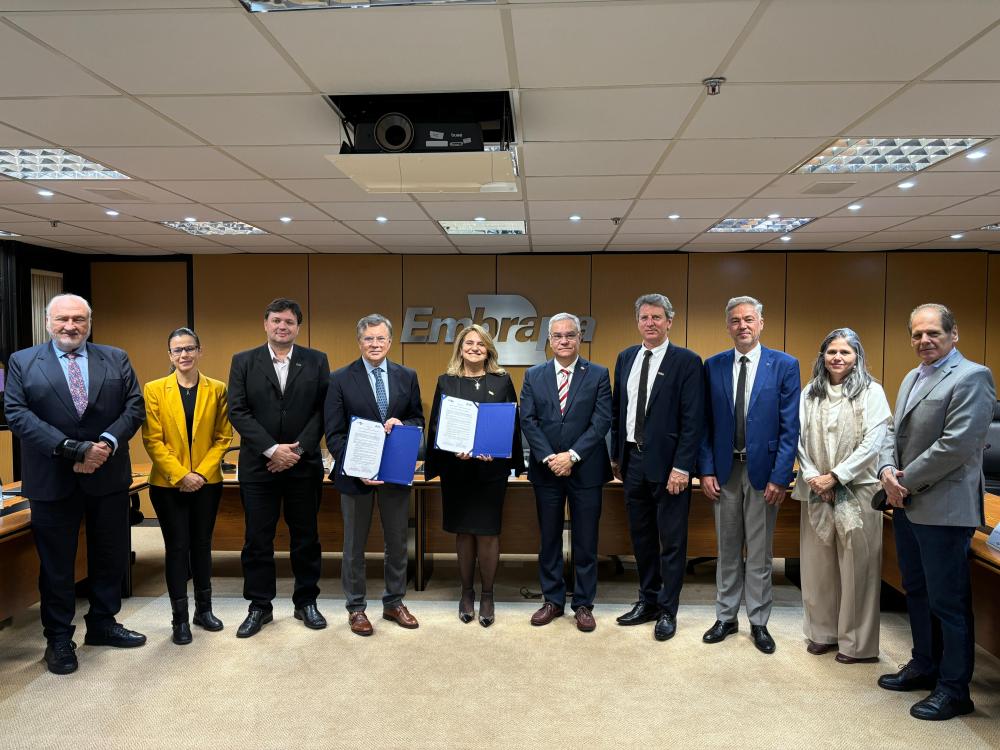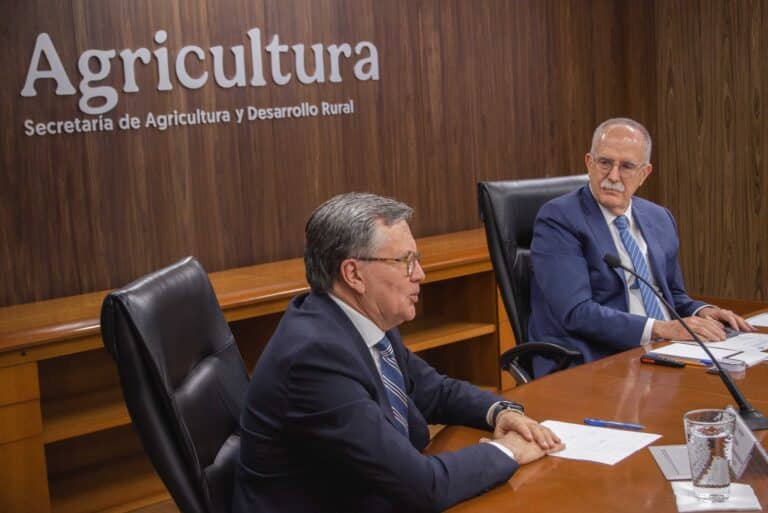Massruhá and Otero signed an agreement at Embrapa’s headquarters in Brasília to strengthen international technical cooperation. The commitment aims to promote the exchange of public policies, technologies, and knowledge, with the objective of implementing concrete actions to benefit the agricultural sector in the near future.

Brasilia, 19 August 2024 (IICA) – The President of the Brazilian Agricultural Research Corporation (Embrapa), Silvia Massruhá, and the Director General of the Inter-American Institute for Cooperation on Agriculture (IICA), Manuel Otero, agreed to develop an international joint work agenda to strengthen agricultural research and innovation and promote the global positioning of sustainable agriculture.
At Embrapa’s headquarters in Brazil’s capital, Massruhá and Otero signed a commitment to facilitate international technical cooperation actions and promote the exchange of public policies, technologies, and knowledge, which they indicated will soon become concrete actions benefiting the agricultural sector.
During the meeting, the Director General of IICA announced the creation of the “José Ireneu Cabral Fund,” with an initial seed capital of $100,000 to finance exchanges of agricultural researchers, facilitating the presence of African researchers in Brazil, specifically at Embrapa, aiming at the development of regenerative tropical agriculture in Africa.
There are also plans to send Brazilian researchers to Central America and the Caribbean, two regions that, like Brazil half a century ago, need to strengthen their agricultural sectors and increase local food production.
José Irineu Cabral was the first Director and President of Embrapa, appointed in 1973 when this lawyer and economist, who devoted his life to agricultural development, was the IICA Representative in Brazil.
In addition to developing cooperation projects with Africa, Embrapa and IICA committed to working together in institutional spaces at COP29, which will be held in Azerbaijan in November, and COP30, which Brazil will host in 2025.
In this regard, the Director General of IICA invited the President of Embrapa to participate in the technical and political activities of the Home of Sustainable Agriculture in the Americas Pavilion, which IICA will install in the Azerbaijani capital, as it did in 2022 and 2023 in Egypt and the United Arab Emirates.
The pavilion has become a significant space for governments, research entities, and the private sector in the Americas to showcase the hemisphere’s agricultural commitment to global food security and sustainability, also contributing to raising awareness and positioning agriculture as a key activity for peace, sustainable development, and the decarbonization of the economy.
Otero also offered Embrapa a support office at IICA’s headquarters in San José, Costa Rica, with the goal of collaborating on the creation of a tropical agriculture platform in the Americas.
“Our continent produces 30% of the world’s food. It is time for a newfound connection between agriculture and the environment, with the inclusion of new stakeholders, transformations, and digital cooperation. Embrapa is a fundamental partner that provides science and innovation. And when it comes to food security, Latin America and Africa, due to their agricultural potential, represent the present and the future. In Africa, when Brazil is mentioned, Embrapa is mentioned,” said Otero.
Massruhá praised IICA’s role as a driver of collective action and agricultural innovation and pointed out that the new scenario —encompassing nutritional transition, sustainability, traceability, and climate change— “requires the productive inclusion of small and medium-sized producers.”
“Only 10% of Brazil’s five million rural producers are large exporters, and we have three million who need to increase their income. For that, they need access to technology to reduce costs, improve management, and be sustainable. The challenge is great, but so is the motivation, and the role of partners like IICA is key,” said the President of Embrapa.
The Brazilian Agricultural Research Corporation (Embrapa) is considered one of the largest agricultural research organizations in the world. Its mission is to provide innovation, generate knowledge, and develop technologies for agriculture in Brazil. Founded in 1973, it is a public company dedicated to developing the technological foundations of a genuinely tropical agriculture and livestock model and ensuring Brazil’s food security and leadership in the international markets for food, fiber, and energy.
Otero visited Embrapa accompanied by Jorge Werthein, his Special Advisor; Christian Fischer, IICA’s Acting Representative in Brazil; and Fernando Camargo, IICA’s Representative in Argentina.
More information:
Institutional Communication Division.
comunicacion.institucional@iica.int











